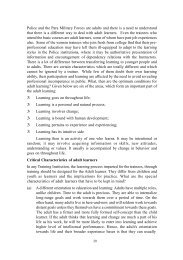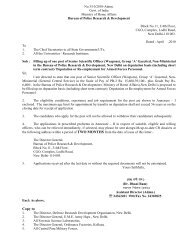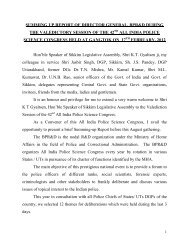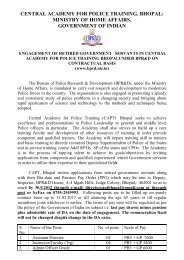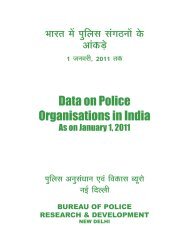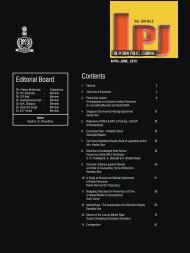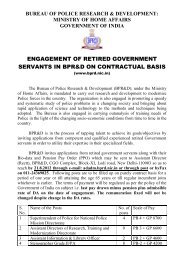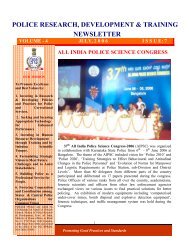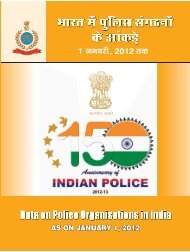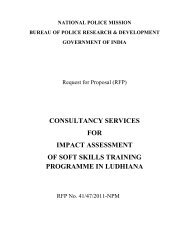Counter-Terrorism Centre, ‘accountability’, <strong>and</strong>,in a critique arising from a different direction,the interface with human rights <strong>and</strong> fundamentaldemocratic freedoms.While many <strong>of</strong> these concerns are legitimate,they can only be considered secondary, within aframework <strong>of</strong> priorities, to far more urgent issuesthat plague India’s intelligence establishmentin an environment <strong>of</strong> rising security threat.Indeed, unless the more pressing imperatives <strong>of</strong>focus <strong>and</strong> efficiency, legitimacy, capacity <strong>and</strong>capability – including manpower pr<strong>of</strong>iles <strong>and</strong>technological resources – are addressed, thebroader ‘architectural’ discourse will remainunproductive, even meaningless.More crucially, all these concerns, both the ‘higherorder’ discourse on meta-institutional reforms <strong>and</strong>the more pragmatic considerations <strong>of</strong> capacity,collapse into the more fundamental enquiry:what are the legitimate concerns <strong>and</strong> limits toan intelligence apparatus within the framework<strong>of</strong> democracy – <strong>and</strong> more specifically, India’sdemocracy? And its corollary: how are theseto be realized? If a clear, coherent <strong>and</strong> detailedanswer could be found to these questions, most<strong>of</strong> the remaining conundrums would easily meltaway.Within the theory <strong>of</strong> democracy, there is apowerful stream <strong>of</strong> justification that argues thatdemocracy is, itself, to be maximised as an‘ultimate value’, as opposed to the contrastingoptions <strong>of</strong> ‘authoritarianism’ or ‘tyranny’. Such aframing <strong>of</strong> the question is obviously emotionallyloaded – for how could authoritarianism ortyranny be preferred to democracy, freedom <strong>and</strong>the rights <strong>of</strong> man? Advocates <strong>of</strong> this thesis tendto emphasise the value <strong>of</strong> certain processes, suchas elections, deliberation, <strong>and</strong> the separation<strong>of</strong> powers, <strong>and</strong> various relational <strong>and</strong> ethicalcriteria, such as freedom, equality, justice, rights<strong>and</strong> participation, which are regarded as good<strong>and</strong> desirable in themselves, without reference tothe objective circumstances <strong>of</strong> their operation orthe results they produce.Such an orientation has resulted, in India’simperfect democracy, in an excessive emphasison form, <strong>and</strong> an enduring neglect <strong>of</strong> substance,with a new institution or new legislation beingproposed to ‘resolve’ every new – or newlyperceived – problem. The abundance <strong>and</strong>impotence <strong>of</strong> existing institutions <strong>and</strong> laws tosecure their purported objectives has done nothingto discourage this orientation, which appears tohave deep roots in the highest institutions <strong>of</strong> thestate, as well as in what passes for the intellectualelite in this country. Within such a framework,clearly, the inherent secrecy <strong>of</strong> operations <strong>of</strong>intelligence agencies would find little legitimatespace, unless it was superimposed with layers <strong>of</strong>oversight which, in present circumstances, wouldeffectively paralyse the agencies from performingany but the most innocuous <strong>and</strong> ineffective <strong>of</strong>functions.Such a perspective, however, militates againstfar more vibrant <strong>and</strong> realistic traditions <strong>of</strong>democracy, which have never shied away fromthe fundamental truth that democracy is, inessence, a system <strong>of</strong> government. Few, in India,underst<strong>and</strong> <strong>and</strong> appreciate the tremendouslyhard-headed realism that underpinneddemocratic theory in its early contours, <strong>and</strong>these origins have been buried deep under theincreasingly deceptive <strong>and</strong> diversionary populism<strong>of</strong> contemporary electoral democracies, not onlyhere, but, increasingly, across the world. Thetruth is, the idea <strong>of</strong> democracy as an end in itself,rooted in the intangibles <strong>of</strong> ‘popular sovereignty’<strong>and</strong> the ‘will <strong>of</strong> the people’, cannot provide anysatisfactory justification without reference tooutcomes. Democracy must find its justificationin the world <strong>of</strong> hard facts. Politics, in our world,is ultimately concerned with the relationshipbetween the governing <strong>and</strong> the governed, <strong>and</strong> ittakes little wisdom to conclude that it is aboutpower, <strong>and</strong> about the outcomes <strong>of</strong> the distribution<strong>and</strong> exercise <strong>of</strong> power. No system <strong>of</strong> governmentcan be an ultimate ideal without reference towhat it can do, or does, for the governed. AsGiovanni Sartori notes, “a democracy cannotpass the test, in the long run, unless it succeeds asa system <strong>of</strong> government. For if a democracy doesnot succeed in being a system <strong>of</strong> government, itdoes not succeed – <strong>and</strong> that is that.”If democracy is to succeed in practical – <strong>and</strong> notmerely notional – terms, it must, first <strong>and</strong> aboveall, be secured. It must recognize the variousthreats to which it is exposed, <strong>and</strong> acquire thecapacities <strong>and</strong> capabilities to confront <strong>and</strong>neutralize these.44The Indian <strong>Police</strong> Journal, October - December, 2012, Special Issue
Democracies are, today, everywhere underunprecedented attack. Fundamentalist creeds<strong>and</strong> ideologies <strong>of</strong> hatred <strong>and</strong> enveloping violencehave created movements that seek millennialtransformations that would destroy, not justdemocracy, but civilization itself <strong>and</strong> all thefreedoms that have come to comprise it. Suchmovements have, <strong>of</strong> course, secured only verylimited success against the broader democraticedifice <strong>and</strong> endeavour, but even where this is thecase, the damage they have done is colossal. Theextraordinary costs they have inflicted, not onlyin the visible terms <strong>of</strong> lives <strong>and</strong> resources lost, but<strong>of</strong> the long term opportunities <strong>of</strong> development,the loss <strong>of</strong> freedom for large populations, <strong>and</strong> theinstability, disorders <strong>and</strong> suffering they generateeven through occasional acts <strong>of</strong> disruption, canhardly be quantified.These threats are infinitely compounded by aregime <strong>of</strong> collusion <strong>and</strong> criminalization <strong>of</strong> thestate apparatus that has weakened governanceeverywhere. The Vohra Committee had writtenabout the urgency <strong>of</strong> breaking down the politicianbureaucrat-criminalnexus after the 1993 Mumbaibombings. Nearly two decades later, if anything,this nexus appears immensely stronger. It needsto be constantly reiterated that the activities <strong>of</strong> thecorrosive cabal <strong>of</strong> the corrupt, that is eating awayat the democratic <strong>and</strong> constitutional edifice fromwithin, is not only a law <strong>and</strong> order, but an urgentinternal security concern for the country. An elitewhose urge for domination is easily translatedinto a cynical machtpolitik based on force, fraud,<strong>and</strong> the ruthless use <strong>of</strong> power, is as much adanger <strong>and</strong> possibly even more detrimental to thenational interest, than any terrorist movement.It is necessary to recognize, moreover, that majorcrimes occur within an enabling environment thatcomprises a multitude <strong>of</strong> lesser transgressions;that the distressing theatre <strong>of</strong> a catastrophicterrorist attack is the culmination <strong>of</strong> a protractedseries <strong>of</strong> concealed – <strong>and</strong> preventable – <strong>of</strong>fencesthat relies on a network that services both petty<strong>and</strong> major crime. The same hawala networks, forinstance, service corrupt politicians, bureaucrats<strong>and</strong> businessmen, as well as terrorists. Smugglingchannels that bring grey market goods intothe country also bring in arms, ammunition<strong>and</strong> explosives. And the same compromisedenforcement agencies <strong>and</strong> personnel ‘look theother way’, when such crimes occur.It is significant that those who have spokenthe loudest – particularly in the wake <strong>of</strong>major terrorist attacks – about reforming <strong>and</strong>restructuring India’s intelligence ‘architecture’,have tended to maintain a deafening silence onan overwhelming proportion <strong>of</strong> these concerns,preferring to exploit the hysteria provoked byoccasional acts <strong>of</strong> terrorism to augment thepowers <strong>of</strong> select institutions, or to surreptitiouslyalter the constitutional distribution <strong>of</strong> powersbetween the Centre <strong>and</strong> the States.Nevertheless, within the broader context <strong>of</strong> themultiplicity <strong>of</strong> threats to national security <strong>and</strong>their impact on the rights <strong>and</strong> welfare <strong>of</strong> theaverage civilian, it is evident that the presumption<strong>of</strong> an inherent contradiction between intelligence<strong>and</strong> human rights or democratic freedomsis fundamentally false. Indeed, intelligenceoperations are <strong>of</strong>ten crucial in the protection<strong>of</strong> human rights, particularly where these arethreatened by organised criminal or terroristviolence, by deviant elements within the stateapparatus, <strong>and</strong> by the distortions that corruption<strong>and</strong> abuse <strong>of</strong> power introduce into the framework<strong>of</strong> constitutional governance. In the absence <strong>of</strong>effective intelligence, no possible preventive orcorrective to these ills can be found. All theseissues necessarily fall within the legitimate <strong>and</strong>pressing concerns <strong>of</strong> a principled intelligenceagency within a democratic framework. There is,here, no necessary conflict between democraticvalues <strong>and</strong> individual freedoms, on the oneh<strong>and</strong>, <strong>and</strong> intelligence operations, on the other.Principled intelligence operations are, in fact,necessary to the fuller exercise <strong>of</strong> freedom bythe average citizen. It cannot be the case, withinany just system <strong>of</strong> democracy, that the rights <strong>of</strong>criminals <strong>and</strong> those who violently transgress thelaw should have precedence over the rights <strong>of</strong>their victims – both potential <strong>and</strong> actual; this,however, is what the system for the protection <strong>of</strong>rights has come to mean in India. A just societycannot owe its criminals a protection greater thanit affords those who abide by its laws.It is useful to notice, here, that much <strong>of</strong> theassault on democracy is ideological, subversive<strong>and</strong> covert, <strong>and</strong> is executed through agenciesthat tread the margins <strong>of</strong> the law. Virtually allinsurgent, terrorist <strong>and</strong> organised criminal groups,today, set up front organisations, or penetrate <strong>and</strong>The Indian <strong>Police</strong> Journal, October - December, 2012, Special Issue 45
- Page 1 and 2:
The Indian Police JournalOctober -
- Page 3 and 4:
From the Director’s DeskNew Delhi
- Page 5 and 6:
23rd December, 1887: TheJourney beg
- Page 7 and 8: Courtesy - National Archives of Ind
- Page 9 and 10: The Logo released on the completion
- Page 11 and 12: Helmsmen of the IB during thePre-In
- Page 13 and 14: SHRI V.G. VAIDYA, IPS(MAR 1992 TO J
- Page 15 and 16: “Sleeman sahib ki jai”“No Cri
- Page 17 and 18: their life and their problems relat
- Page 19 and 20: Settling down of criminal tribes wa
- Page 21 and 22: perish. Between 1841 and 1848, anot
- Page 23 and 24: In conclusion, I would like to reco
- Page 25 and 26: own race alone, had to be withdrawn
- Page 27 and 28: a bee in his bonnet” 17 , and abo
- Page 29 and 30: epresented by Tilak and his followe
- Page 31 and 32: The agency more and more fine-tuned
- Page 33 and 34: US was brewing, one William Hopkins
- Page 35 and 36: came under the control of Indian mi
- Page 37 and 38: neutralised many efforts by inimica
- Page 39 and 40: e published by the Intelligence Bur
- Page 41 and 42: As DD (Security), IB, I had occasio
- Page 43 and 44: Chhomohlohri, all of them juxtapose
- Page 45 and 46: Dormers Building, ShimlaThe Dormers
- Page 47 and 48: eforms. Warren Commission, on the a
- Page 49 and 50: and systems will increasingly come
- Page 51 and 52: violence and destabilisation. This
- Page 53 and 54: one develop. The all pervasive cult
- Page 55 and 56: etween the states and the centre su
- Page 57: Intelligence Agencies inIndian Demo
- Page 61 and 62: depend substantially on the restrai
- Page 63 and 64: Of Pistols and Pigs andthe Old Tidd
- Page 65 and 66: it is lovingly caressed hundreds of
- Page 67 and 68: Through the Eyes of an IB OfficerSh
- Page 69 and 70: an Intelligence agency. He used to
- Page 71 and 72: My J&K ExperienceShri R.K. Kapoor,
- Page 73 and 74: there. We remained stranded there f
- Page 75 and 76: Scaling Himalayan Heights withthe I
- Page 77 and 78: proceed to Dungti to supervise the
- Page 79 and 80: tour of the White House and Lincoln
- Page 81 and 82: into unconsciousness two hours earl
- Page 83 and 84: which was completed successfully wi
- Page 85 and 86: leaders. This happened around the t
- Page 87 and 88: My Unforgettable Yearsin the North-
- Page 89 and 90: stated that Prakash Singh, Assistan
- Page 91 and 92: take her into confidence. That woul
- Page 93 and 94: Police - Intelligence InterfaceShri
- Page 95 and 96: Shreekant Bapat and I surveyed the
- Page 97 and 98: excellence, dedication and commitme
- Page 99 and 100: Immigration, Inter-State Disputes,
- Page 101 and 102: Observations on India’s State and
- Page 103 and 104: assessments that arose after the ca
- Page 105 and 106: levels. The deficiencies of one par
- Page 107 and 108: of laying a network of useful roads
- Page 109 and 110:
Technology in Intelligence-Future S
- Page 111 and 112:
These are just some of the aspects
- Page 113 and 114:
Figure 6: Open Source Information o
- Page 115 and 116:
events) and inference from evidence
- Page 117 and 118:
9North Atlantic Treaty Organization
- Page 119 and 120:
Shri Dave was posted back to the lB
- Page 121 and 122:
He even suggested separate pay scal
- Page 123 and 124:
The Unsung HeroesThe Intelligence B



